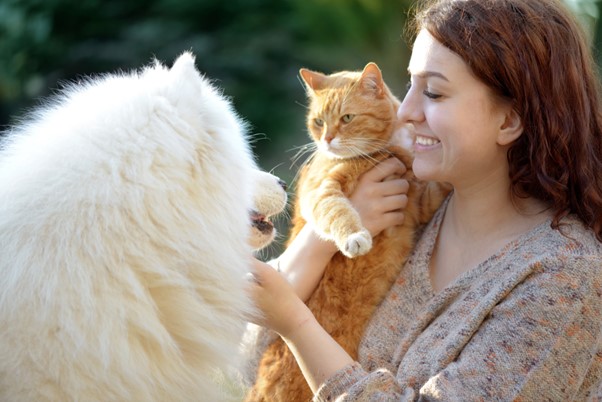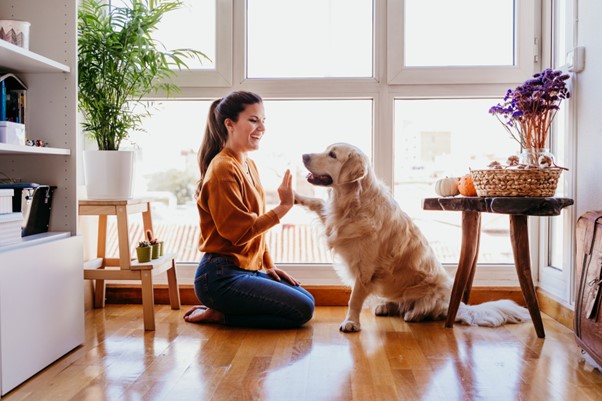Managing Anxiety with the Help of Pets

Managing Anxiety with the Help of Pets
Anxiety is a common mental health issue that affects many people, but did you know that pets can be a valuable part of managing anxiety? Our furry friends not only provide companionship but also offer numerous benefits that can help alleviate symptoms of anxiety.
How Pets Help Manage Anxiety
- Unconditional Love and Companionship Pets offer unconditional love and companionship, which can be incredibly comforting for those struggling with anxiety. The presence of a pet reduces feelings of loneliness and provides a sense of purpose, contributing to emotional stability and a positive outlook on life [1].
- Physical Activity Regular exercise is a well-known method for reducing anxiety. Pets, especially dogs, encourage physical activity. Daily walks, playtime, and outdoor activities boost mood and lower stress levels. This physical activity helps release endorphins, the body’s natural stress relievers, leading to improved mental health [2].
- Routine and Structure Having a pet brings routine and structure to your day. Feeding, walking, and caring for a pet creates a predictable schedule, which can help reduce anxiety by providing stability and a sense of control. A structured day helps to keep the mind occupied and reduces the time available for worrying [3].
- Social Interaction Pets are great social facilitators. Taking your dog to a park or engaging in pet-related activities increases opportunities for social interaction, which helps to alleviate feelings of isolation and anxiety. Socializing with other pet owners can provide support and friendship, further reducing anxiety levels [4].
- Mindfulness and Relaxation Pets live in the moment, and spending time with them encourages mindfulness and relaxation. Stroking a cat, playing with a dog, or watching fish swim are calming activities that help you stay present and reduce anxiety. These activities can lower heart rates and blood pressure, promoting a sense of calm [5].
- Emotional Support The bond with a pet provides emotional support, reducing stress and anxiety. Pets can sense their owner’s mood and often respond with affection and comfort. This emotional connection helps to regulate feelings and provides a sense of security and calm [6].
Tips for Managing Pet Anxiety
It’s also important to recognize that pets can experience anxiety too. Here are some tips to help manage your pet’s anxiety:
Create a Safe Space
Ensure your pet has a comfortable and secure area to retreat to during stressful times. This can be a quiet room or a cozy crate where your pet feels safe. Providing blankets, toys, and familiar items can help create a calming environment for your pet [9].
Regular Exercise
Physical activity can help reduce anxiety in pets, just as it does in humans. Regular walks, play sessions, and interactive games can help expend excess energy and reduce stress levels. Exercise also stimulates the production of serotonin, a neurotransmitter that promotes feelings of well-being and relaxation [13].
Consistent Routine
Maintain a regular routine for feeding, walking, and playtime to provide stability and reduce stress. Pets thrive on predictability, and having a set schedule can help them feel more secure. Consistent routines help pets understand what to expect, which can significantly reduce anxiety [9].
Provide Soothing Sounds
Playing soothing music or white noise can help distract your pet from anxiety-inducing noises, such as thunderstorms or fireworks. This auditory stimulation can have a calming effect and reduce the overall stress your pet experiences during such events [12].
Use Anxiety-Reducing Products
Consider using products designed to reduce anxiety in pets. These can include pheromone diffusers, anxiety wraps, or calming treats. Pheromone diffusers release synthetic versions of calming scents naturally produced by animals, while anxiety wraps provide gentle pressure to help soothe pets [10].
Professional Help
If your pet’s anxiety is severe, consult a veterinarian for professional advice and possible treatment options. Your vet can provide recommendations for behavior modification techniques, medications, or refer you to a veterinary behaviorist for specialized help [14].
Avoid Triggers
Identify and avoid anxiety triggers whenever possible. For example, if your pet is afraid of loud noises, create a quiet space for them during thunderstorms or fireworks. If separation anxiety is an issue, practice gradual desensitization by leaving your pet alone for short periods and gradually increasing the time [11].
Engage in Interactive Play
Interactive playtime can keep your pet mentally stimulated and reduce anxiety. Toys that challenge your pet’s problem-solving skills, such as puzzle feeders or treat-dispensing toys, can help keep them engaged and distracted from anxiety-inducing situations [13].
Tips for Managing Pet Anxiety
It’s also important to recognize that pets can experience anxiety too. Here are some tips to help manage your pet’s anxiety:
- Create a Safe Space: Ensure your pet has a comfortable and secure area to retreat to during stressful times [7].
- Regular Exercise: Physical activity can help reduce anxiety in pets, just as it does in humans [5].
- Consistent Routine: Maintain a regular routine for feeding, walking, and playtime to provide stability and reduce stress [7].
- Professional Help: If your pet’s anxiety is severe, consult a veterinarian for professional advice and possible treatment options [8].
Conclusion
Pets can play a significant role in managing anxiety by providing companionship, encouraging physical activity, and adding structure to your life. Additionally, ensuring the well-being of your pet by managing their anxiety can create a mutually beneficial relationship that enhances the quality of life for both of you.
🌐 Sources
- mentalhealth.org.uk – Pets and mental health
- heart.org – 5 Ways Pets Help with Stress and Mental Health
- healthdirect.gov.au – 7 ways pets improve your mental health
- newsinhealth.nih.gov – The Power of Pets
- smalldoorvet.com – How Do Pets Help With Anxiety and Uncertainty
- apa.org – In brief: Pets can help reduce anxiety, boredom during tests
- iPromea – Understanding and Alleviating Anxiety in Pets
- Whitney Vet – Pet Anxiety: Causes and Management Strategies
- botetourtvet.com – Managing Your Pet’s Anxiety
- heartandpaw.com – 10 Tips for Managing Your Pet’s Anxiety
- carrumdownsvet.com.au – Tips for managing your dog’s anxiety
- villagevetcareclinic.com.au – 5 Practical Tips to Help Your Pet Cope With Anxiety
- theage.com.au – How to manage your pet’s anxiety
- akc.org – Expert Tips to Help Soothe Your Dog’s Anxiety








Responses